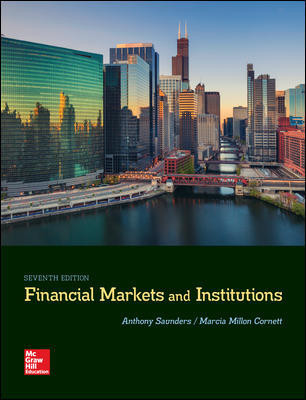Test Bank for Financial Markets and Institutions 7th Edition By Saunders
Test Bank for Financial Markets and Institutions 7th Edition By Saunders
Financial Markets and Institutions 7th Edition By Saunders – Test Bank
Financial Markets and Institutions 7th Edition
Financial Markets and Institutions
Chapter 1 Introduction
1) Primary markets are markets in which users of funds raise cash by selling securities to funds suppliers.
2) Secondary markets are markets used by corporations to raise cash by issuing securities for a short time period.
3) Corporate security issuers are always directly involved in funds transfers in the secondary market.
4) The NYSE is an example of a secondary market.
5) Central governments sometimes indirectly intervene in foreign exchange markets by affecting foreign exchange rates through raising or lowering interest rates.
6) Money markets are the markets for securities with an original maturity of one year or less.
7) Financial intermediaries rather than financial systems are the most common agents to channel funds from the suppliers to the users of funds.
8) There are three types of major financial markets today: primary, secondary, and derivatives markets. The NYSE and NASDAQ are both examples of derivatives markets.
9) Asset transformation by financial intermediaries involves increasing the risk attributes of securities such as mortgages, bonds, and stocks.
10) One of the factors responsible for globalization of financial markets and institutions is deregulation.
11) The average cost incurred by financial institutions to collect information is larger than that of individuals.
12) The Volcker Rule prohibits U.S. depository institutions from engaging in proprietary trading.
13) Financial intermediation provides direct transfer of funds to the users.
14) In the United States the SEC provides deposit insurance for $250,000 per person per bank.
15) Enterprise Risk Management (ERM) system is responsible for managing the totality of a firm’s risk exposures.
16) What factors are encouraging financial institutions to offer overlapping financial services such as banking, investment banking, brokerage, etc.?
- Regulatory changes allowing institutions to offer more services
- Technological improvements reducing the cost of providing financial services
III. Increasing competition from full-service global financial institutions
- Reduction in the need to manage risk at financial institutions
- A) I only
- B) II and III only
- C) I, II, and III only
- D) I, II, and IV only
- E) I, II, III, and IV








